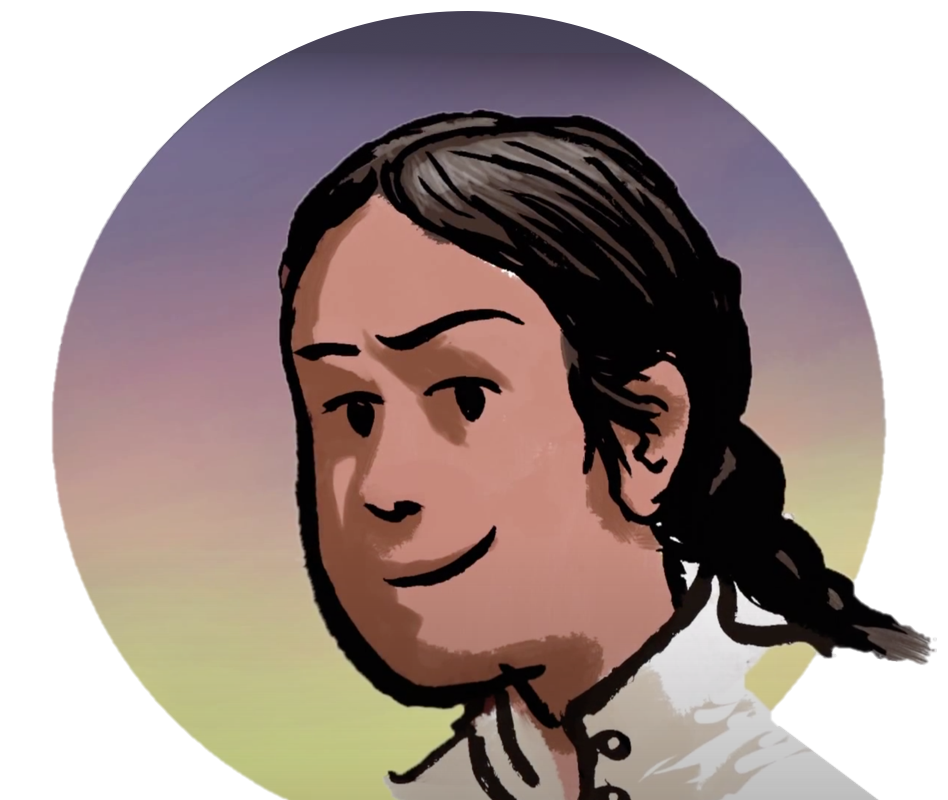Section 5.6 Huu-ay-aht - ʔeʔimʔaƛquu mimityaqš ʔanaḥʔis Huksyuu
Written by: Veselin Jungic and Mark MacLean
Illustrated by: Simon Roy and Jess Pollard
Huu-ay-aht translation by: Benson Nookemis from the Nuu-Chah-Nulth Nation
ʔanaḥʔis Huksyuu ʔukłaa meʔiƛqacʔi. Saač̓ink wiwipalc̓a. Hiy̓atḥma ʔanaḥʔis maʔas ƛawaa t̓up̓ałʔi ʔukčiqƛ̓as ʔumʔiiqsak n̓uw̓iiqsak.
Small Number is a young boy who gets into a lot of mischief. He lives in a small village by the water with his mother and father.
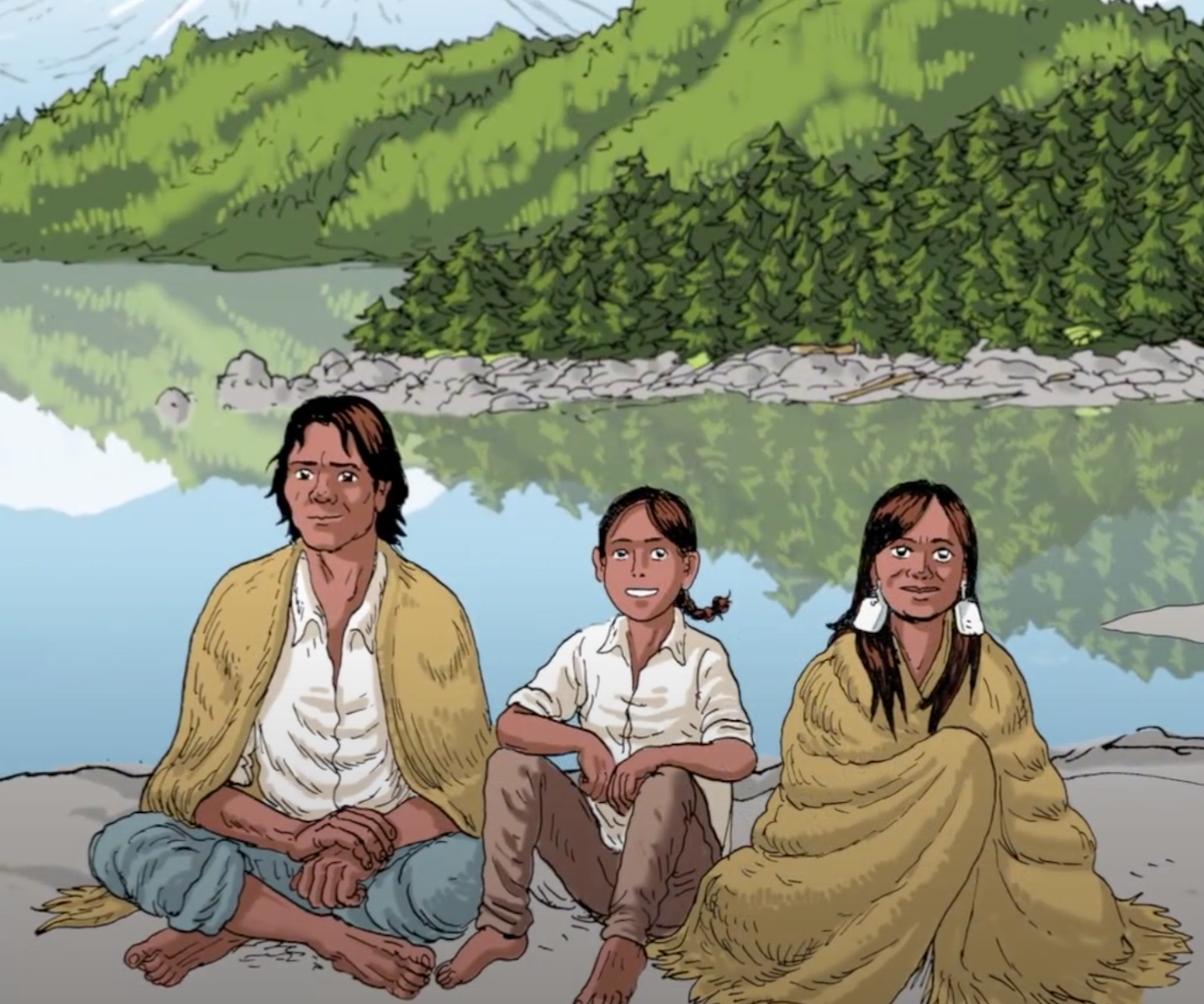
M̓ałuk̓aƛ ʕay̓iičḥ. Hupiiʔaƛ ʔanaḥʔisʔi Huksyuu. “ʔayaačišt̓aƛma miʕaat t̓aaqḥsis taqḥtaak hitinqisʔi. ʔusimʔaaqƛin mityaqšiƛ kuʔał ʔiiqḥiiquu muułuk,” waaʔaƛ n̓uw̓iiqsak ʔanaḥʔis Huksyuu. ʔeʔimw̓it̓asʔaƛ ʔanaḥʔis Huksyuu ʔuukʷił naʔuuqs n̓uw̓iiqsak ʔuʔuʔiiḥw̓it̓as miʕaat. ʔayaaƛuk ʔaʔaatuucamis:
It is a crisp autumn day and Small Number is helping his father to prepare the nets for tomorrow’s salmon harvest. “There is a school of salmon by Straight Line Beach. We need to set our net in the morning while the tide is still high,” says Small Number’s father. It is the first time that Small Number will go with his father to catch salmon and he has many questions.
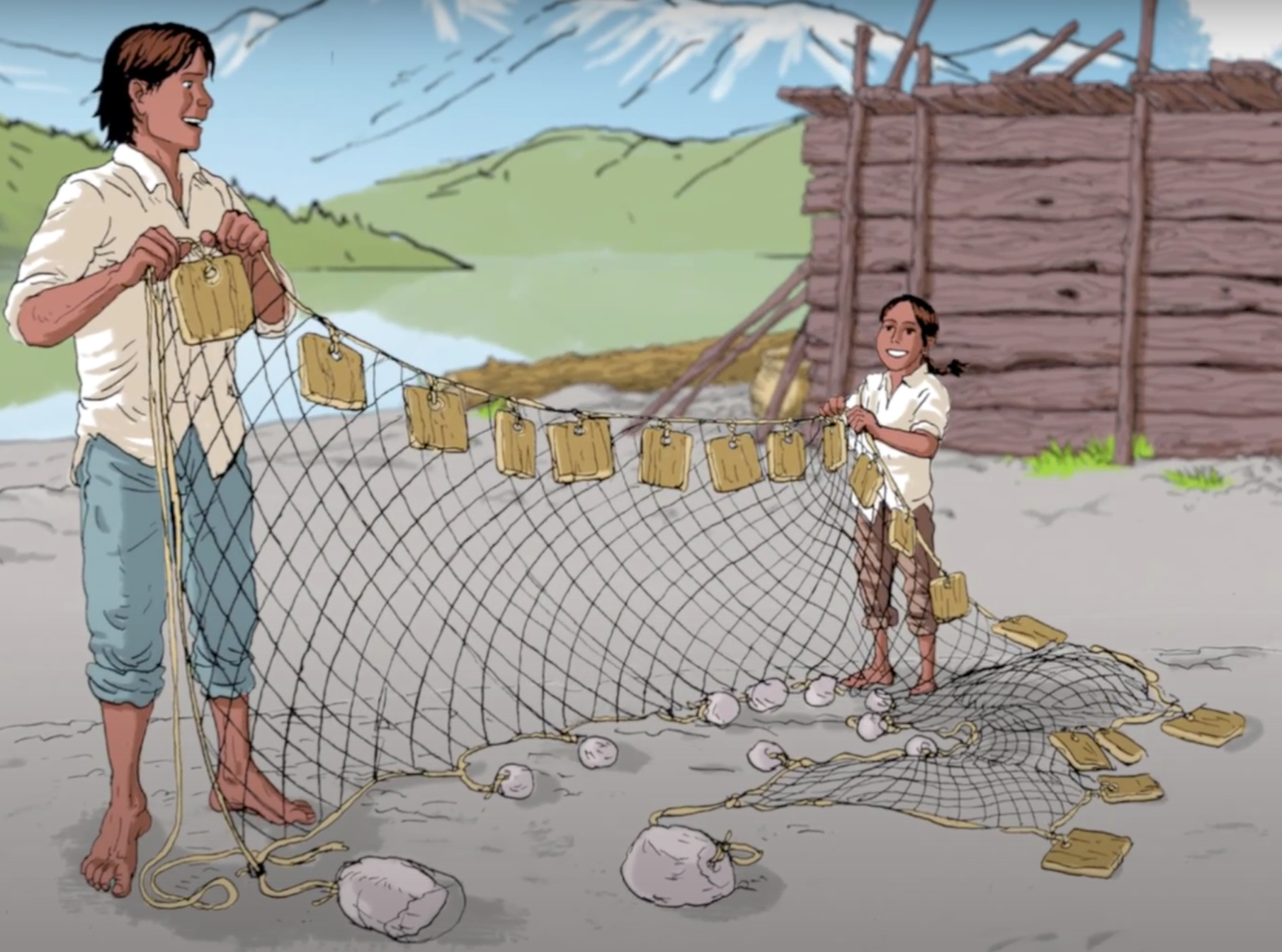
“ʔaaqinqḥʔaƛḥa ʔanaḥʔis m̓uksaapiiḥ c̓awaakcpa ʔanaḥm̓inḥʔisʔi ḥumiis kʷiscpaa mityuuʔi? ʔaaqinqḥʔaƛḥin ʔusim ʔaƛeʔi ʔeʔiiḥ m̓uksy̓i? Čuu kʷatyiikʔi m̓uksy̓im̓inḥʔi? ʔanacm̓inḥḥa? ʔaaqinqḥḥa qʷaa č̓iyuu ḥumiisʔi? ʔaanayi mityuuʔi? čaa ʔanuukʷałʔi mityuuʔi?”
“Why are these round pebbles on one side and those pieces of cedar on the other side of the net? Why do we need those two big rocks? What is the weight of those pebbles? How far apart are they? Why are the pieces of cedar cut in this shape? How long is the net? How deep is the net?”
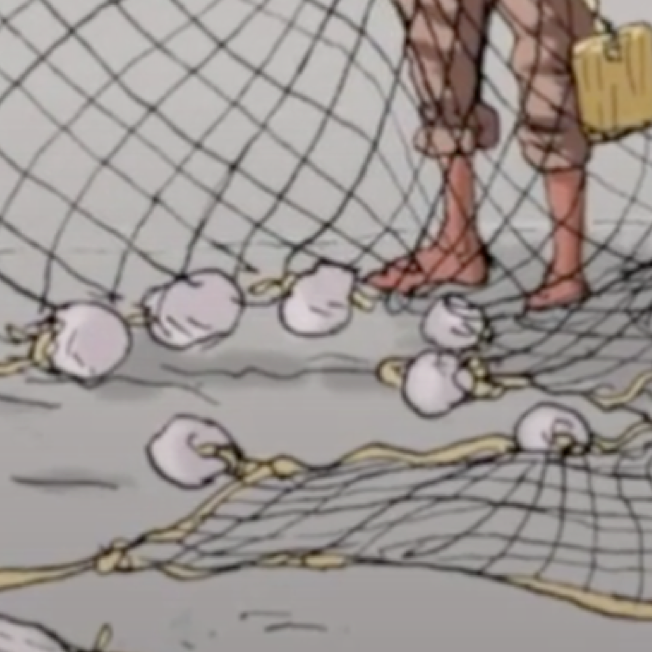
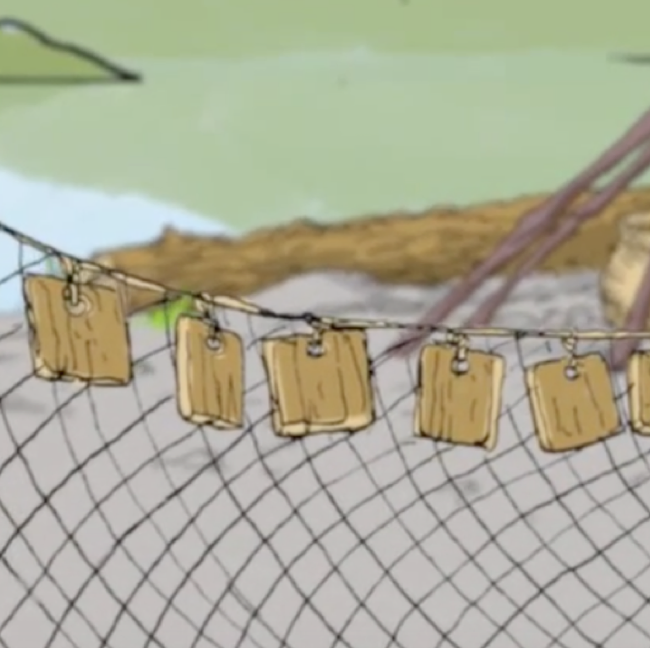
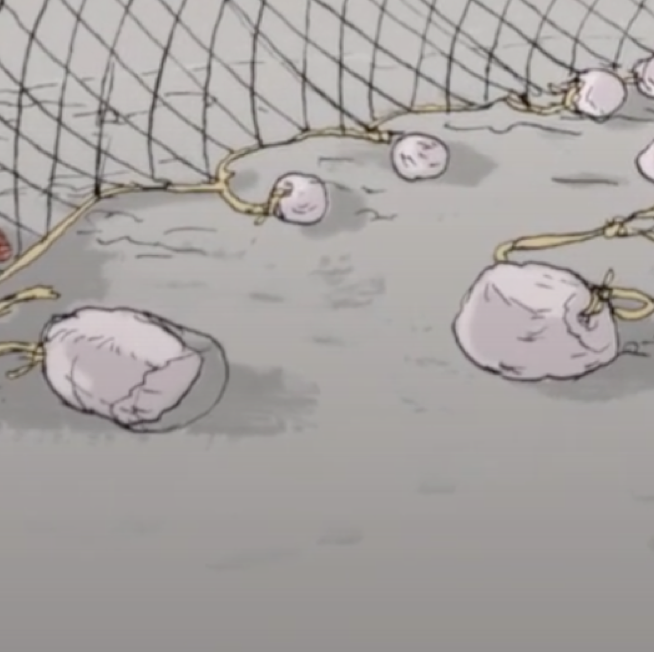
“Wik̓ii ʔeʔiišmiḥsa, ʔanaḥʔis Huksyuu. ʔamiiqḥʔaaqƛeʔic ḥamatsap. ƛiḥšiʔaƛ n̓uw̓iiqsu. Kamatqšiʔaƛči ʔiiqḥuk naniiqsakʔitqak ʔaḥʔaaʔaƛ neʔiiqsu: “Čačimḥaƛma mityuuʔi. ʔusimʔaaqƛmaʔał hił hitinqisʔi wiky̓uuquu n̓eʔiƛšiƛ.”
“Be patient, Small Number, you will learn all tomorrow,” smiles his father. “Now run and tell your grandfather and your uncle that the net is ready and that they should be at our beach before dawn!”
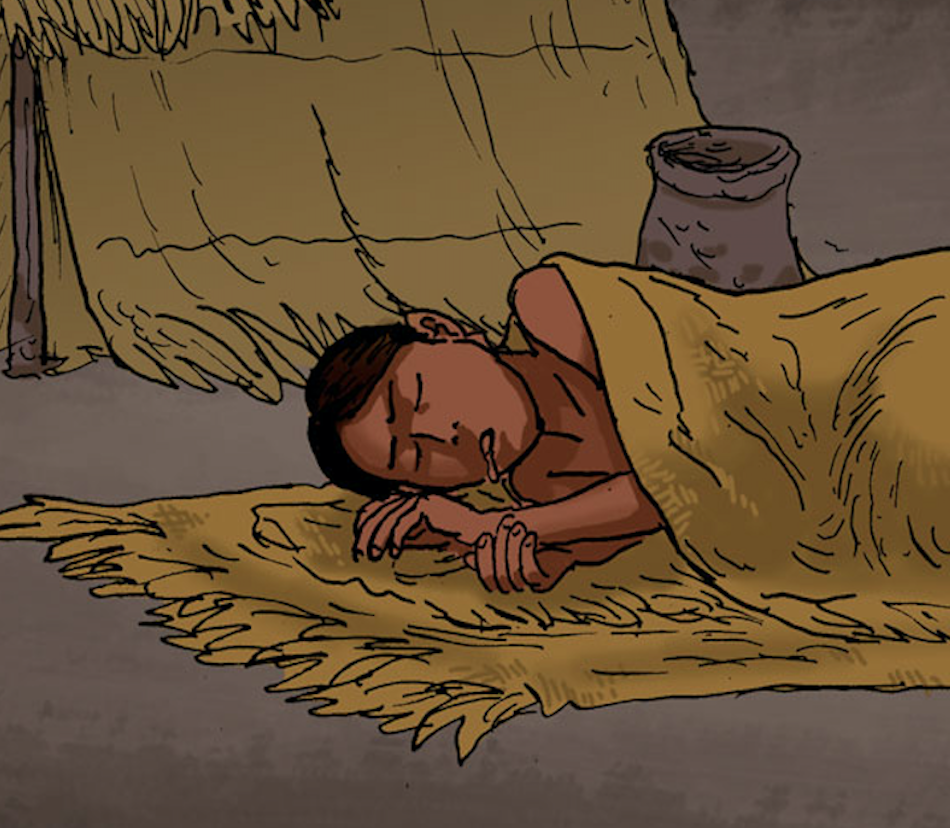
Puw̓icšiʔaƛ ʔuʔutułʔaƛ miʕaat ƛiƛiiḥataƛ huʔaačištuułʔaƛ ʔaḥʔaaʔaƛ ḥustqšiʔaƛ.
Small Number is very excited about his new adventure and when he finally gets to sleep, he dreams about a big salmon jumping out of the water and falling back with a splash.
“ƛupkšiʔi ʔanaḥʔisʔi Huksyuu! Hitinqisʔaƛukʷeʔic n̓uw̓iiqsu, ʔanaḥʔis Huksyuu,” waaʔaƛ̓at ʔumʔiiqsak kinsaatuk.
“Wake up, Small Number. Your dad is already down at our beach,” Small Number hears his mom’s gentle voice.
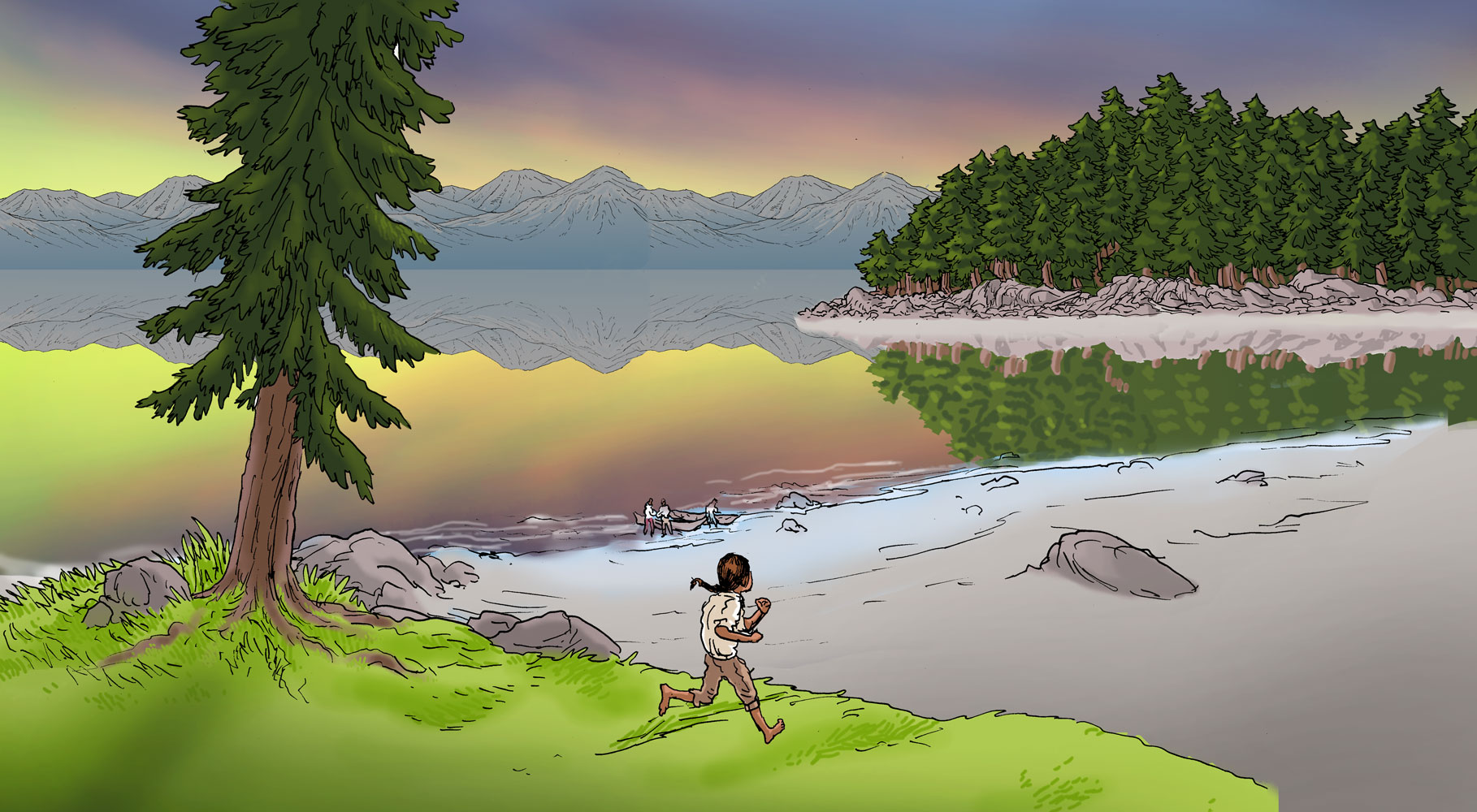
Yacwaasʔaƛ ʔanaḥʔis Huksyuu winapuʔaƛ n̓an̓aačmałapuʔaƛ. N̓ačuʔał tupkqii sačqii nučiim̓inḥ yuuʔatucpa, neʔiičiʔaƛ c̓aʔułatuk ʔaḥʔaaʔaƛ neʔiičiʔaƛ qʷiniim̓inḥ.
When he steps outside, Small Number stops and looks around. He sees dark sharp peaks of mountains to the north and hears the sound of waves and the squawks of seagulls.
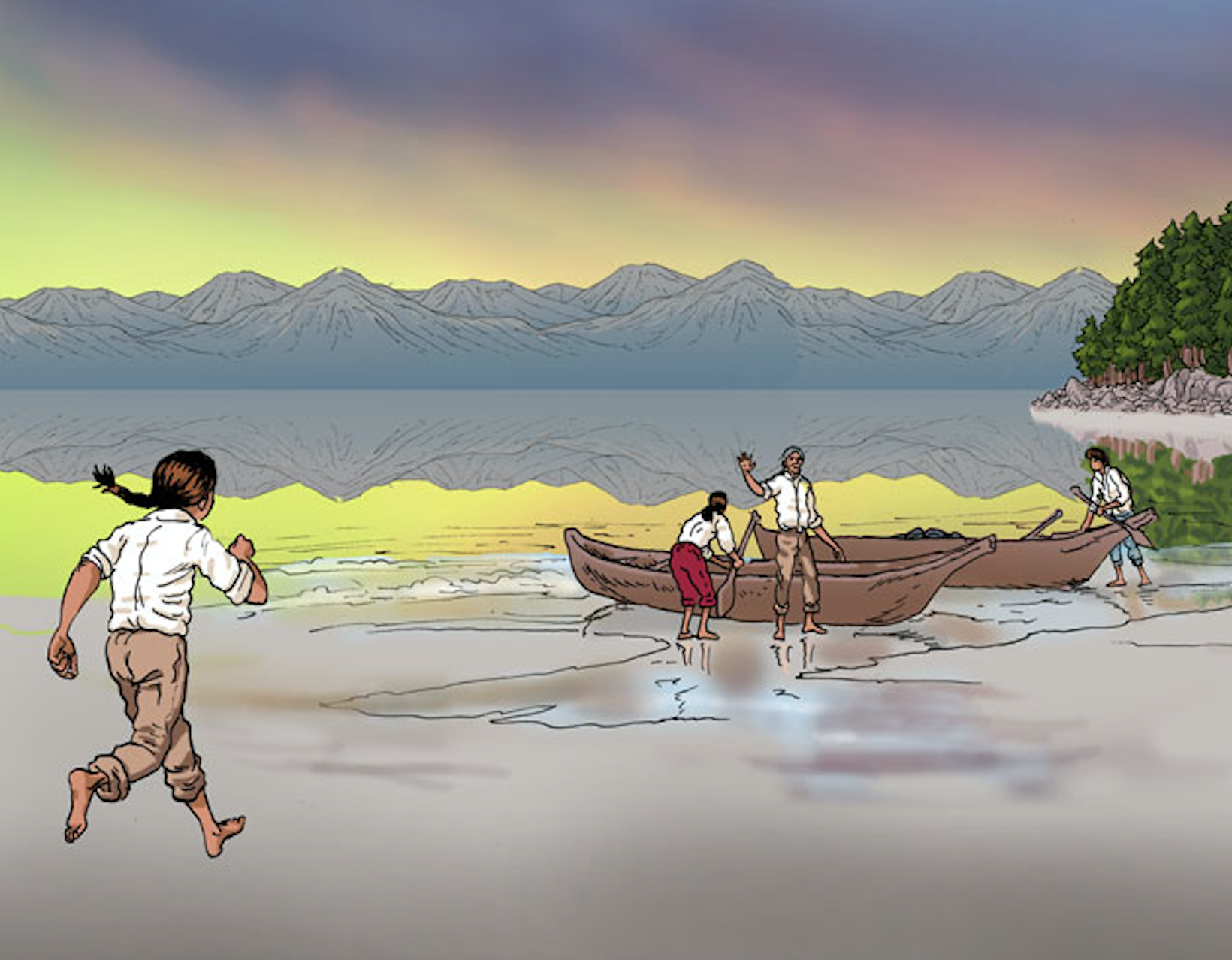
Hitinqisʔaƛ ʔanaḥʔis Huksyuu n̓ačuʔałʔaƛ ʔaya ḥaw̓iiḥaƛ, kamitqšiʔaƛ ʔucaḥtak̓aƛ hisčiiʔi, ƛay̓aax kamitquk ʔucaḥtak. “ʔuʔumḥičiƛeʔic hinin, ʔanaḥʔis Huksyuu,” waaʔaƛ̓at naniiqsu ʕapkʷaaʔaƛ̓at. cumaaʔaƛukʷin č̓apac ʔuqsʔaƛ mityuu ʔaḥʔaaʔaƛ qaʔuuc. Hawičaƛin ʔusimʔaƛin ƛiḥšiƛqun.
Down on the beach, Small Number sees a group of men and starts running towards them as fast as he can. “Just on time, Small Number,” says his grandfather hugging him. “Our canoes are loaded with nets and baskets and we are ready to go.”
Hinasʔaƛʔał t̓aaqsčiikʔi hitinqis, čiiwisčisap̓aƛʔał č̓apacukʔiʔał ʔanaḥʔisʔi Huksyuu naniiqsu neʔiiqsu. *minapaḥsuƛʔał č̓apacʔi ʔanaḥʔis Huksyuu n̓uw̓iiqsak hiniiʔaƛ hiy̓aḥtakʔi mityuu c̓istuup ʔuukʷił naniiqsakʔi.
When they arrive at Straight Line Beach, Small Number’s grandpa and uncle pull their canoe out of the water. Small Number and his father stay in their canoe and pass the ends of the net lines to Grandfather.
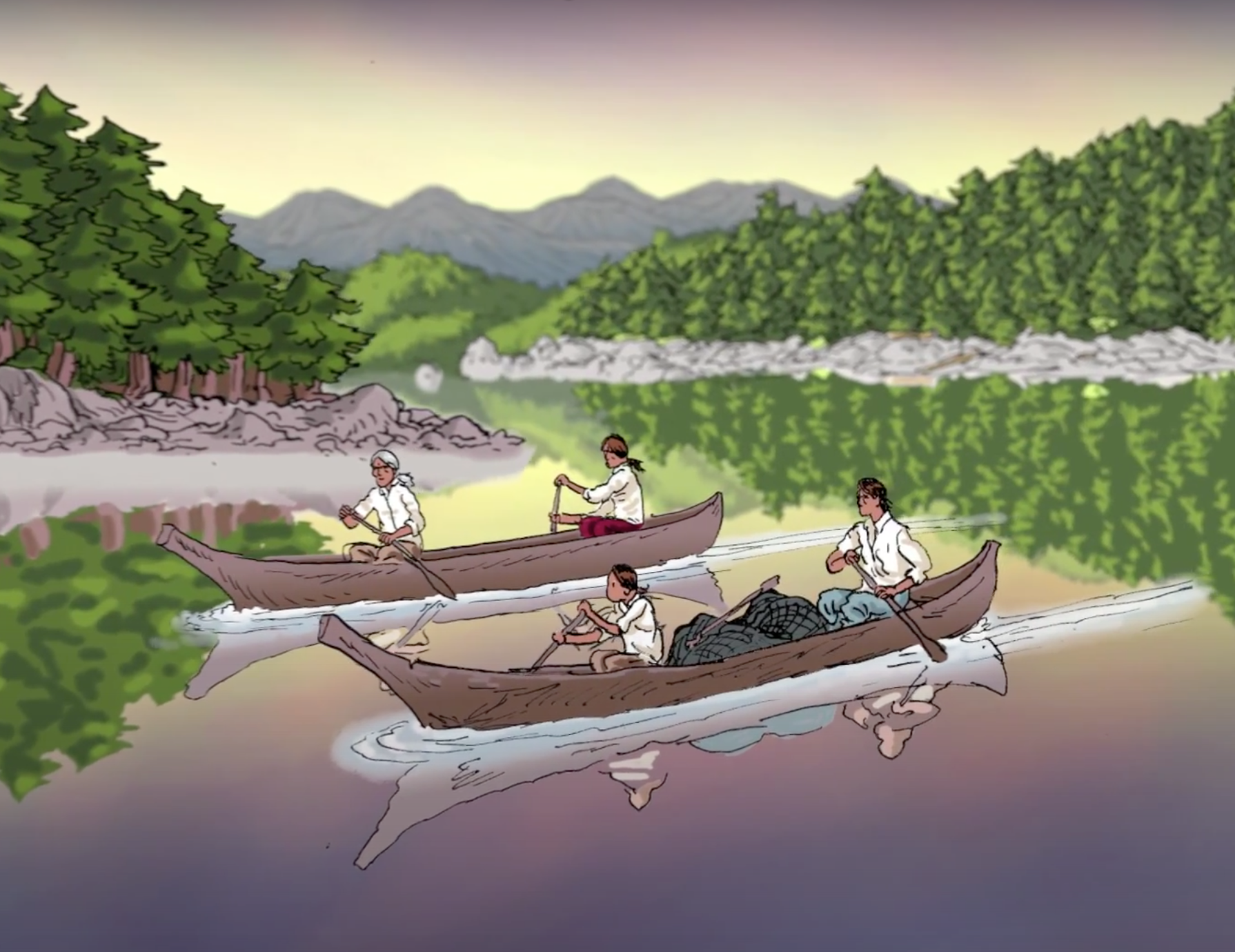
ƛiiḥak̓aƛ ʔanaḥʔis Huksyuu taakḥtačiƛ histaqšiƛ hitinqis. Łaaqłaaquƛ yaa n̓uw̓iiqsak c̓istuupukʔi mityuu. Qʷiyiiʔał hinasʔaƛ mityuuʔi mitxšiʔaƛʔał č̓apacʔi miiłḥcaapiʔaƛ hitinqisʔi ʔaḥʔaaʔaƛ n̓uw̓iiqsu t̓ičiʔaƛ ʔiiḥʔii m̓uksy̓i maƛaał ʔuukʷił mityuuʔi t̓iičištup̓aƛ. “ʔuḥʔaaqƛma t̓ayuusimʔi wiinapup mityuuʔi,” waaʔaƛ̓at ʔanaḥʔisʔi Huksyuu. “Haah,” waaʔaƛ t̓ičiłšiƛ ʔanaḥʔisʔi Huksyuu, “ʔuḥʔaaqƛma m̓ukswaapiiḥʔi wiinapup yee hiy̓apuʔisʔi mityuuʔi ʔaḥʔaaʔaƛ ʔanaḥm̓inḥʔisʔi ḥumiisʔuḥʔaaqƛ̓aƛma puxʷačišt̓ap ƛaʔuucpeʔi mityuuʔi!”
Small Number paddles away from the beach while his dad continues to pay out the net lines. When they reach the beginning of the net, they turn the canoe parallel to the beach and dad throws a big rock that is attached to the net into the water. “This anchor will hold the net in place,” he says to Small Number. “Oh, I see,” yells Small Number, “the pebbles will keep one edge of the net on the bottom and the pieces of cedar will float and keep the other edge of the net on the surface!”
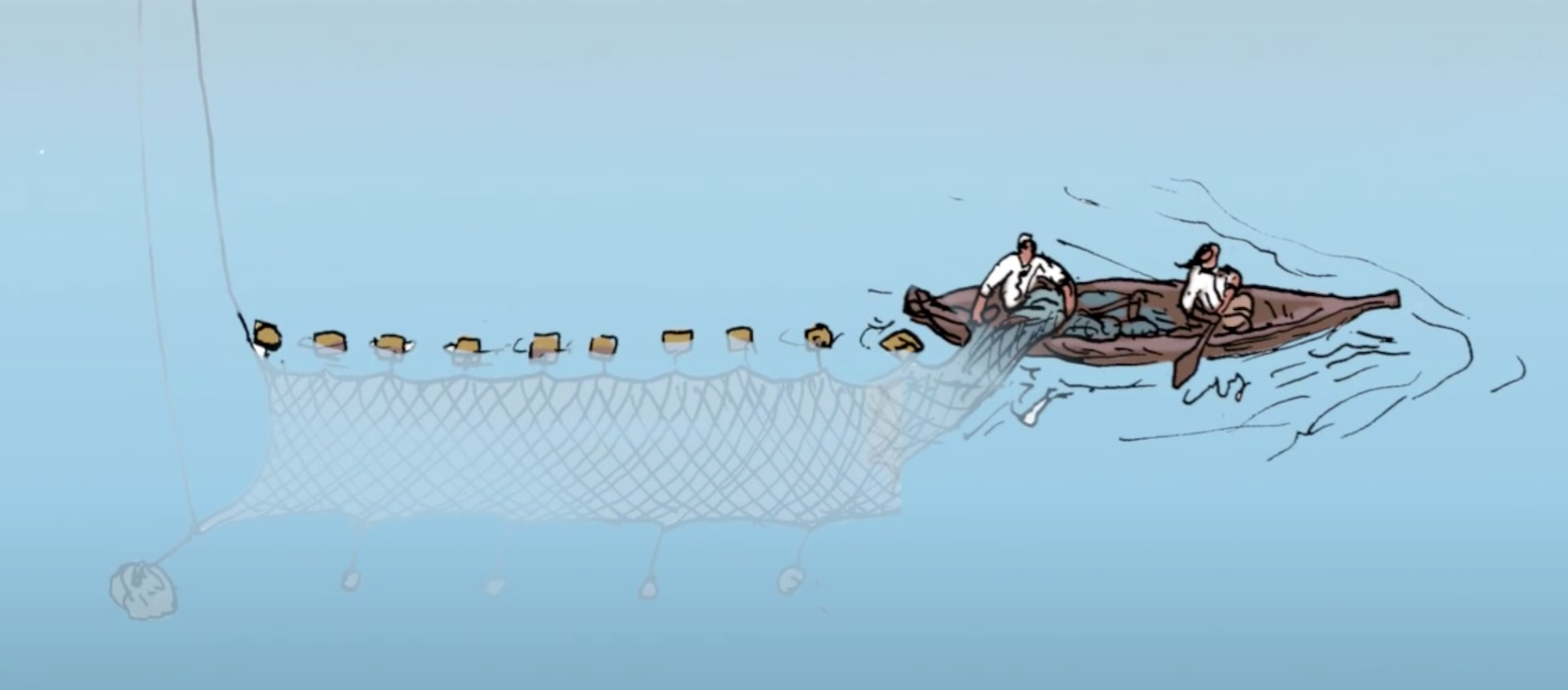
ʔanaḥʔis Huksyuu n̓ačuʔałʔaƛ ʔiiḥtaqimł miʕaat t̓aac̓inƛ ʔuusaaḥi muułšiƛqa. N̓aacsiičiʔaƛ ʔeʔiiḥʔi ƛ̓aaskapiiḥ miʕaat ʔaḥʔaaʔaƛ neʔiičiʔaƛ ƛay̓uučiʔaƛ̓at tiičma. “Čamiḥta našuk qʷac̓ałm̓inḥ miʕaatʔi!”
Small Number sees how a large group of salmon have drifted inshore with the incoming tide. He looks at their large smooth bodies and feels his heartbeat fasten. “How strong and beautiful these fish are!”
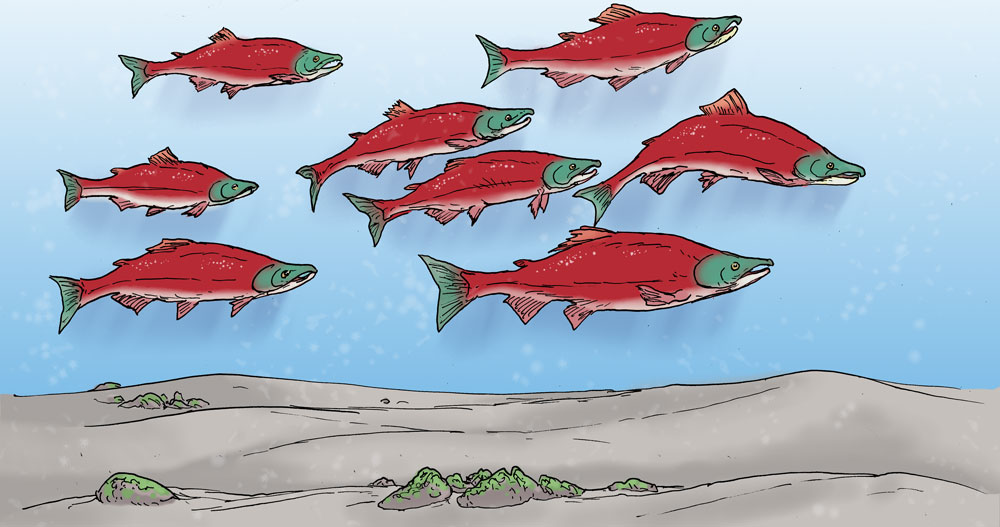
T̓ayuusap̓aƛ t̓ayuusimʔi hiy̓iḥteʔi c̓istuup mityuuʔi ʔaḥʔaaʔaƛ ʔanaḥʔisʔi Huksyuu mitxsaap̓aƛ č̓apacʔi ʔucaḥtak̓apaƛ hitinqisʔi. ʔaḥʔaaʔaƛ n̓uw̓iiqsakʔi łaqšiʔaƛ c̓istuupʔi ʔucaaʔap neʔiiqsakʔi ʔanaḥʔis Huksyuu.
The anchor secures the other end of the net and Small Number turns the canoe towards the beach where his dad passes the net lines to Small Number’s uncle.
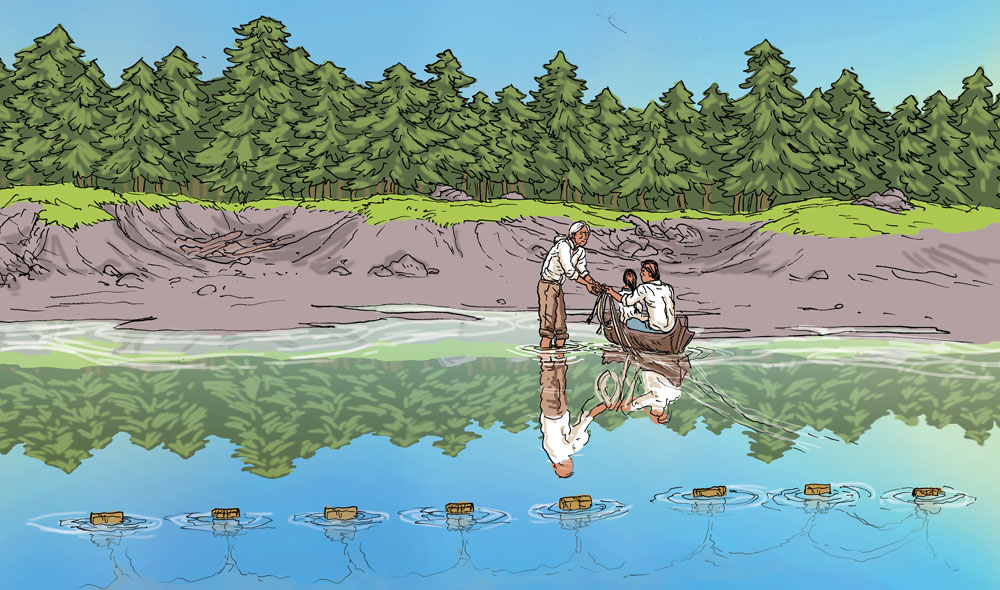

ʔaḥʔaaʔaƛ čiiwisčisap̓aƛ n̓uw̓iiqsu č̓apacukʔiʔał, ʔanaḥʔis Huksyuu ʔaʔaatuuʔaƛƛa: “Qum̓iipʔaaqƛin miʕaat ʔaḥkuu n̓aasʔii? ʔaqisʔaaqƛḥin xaačk̓ʷaap miʕaat ʔuw̓aatinm̓inḥukqin? ʔuʔumḥaaqƛḥa qum̓aa ʔunaakšiƛʔał ḥačatakʔał? ʔaaqisʔaaqƛḥin ḥamat̓ap huʔinquu miʕaat?”
While his dad pulls the canoe out of water, Small Number asks, “How many salmon will we catch today? How are we going to divide the salmon among our families? Will there be enough for everybody? How do we know that the salmon will come back?”
“Ḥamat̓aminʔaała,” waaʔaƛ n̓uw̓iiqsuʔi. Wiinapuƛ̓ama ʔaḥkuu hił: “Hupiiʔaƛsuk neʔiiqsakʔitqak čiiƛčiiya c̓istuupʔi ʔucaḥtak mityuuʔi. Hupiiʔaaqƛaḥ naniiqsu.”
“We have our ways,” answers his father. “Now, you stay here to help your uncle pull on the net lines. I’m going to help grandpa.”
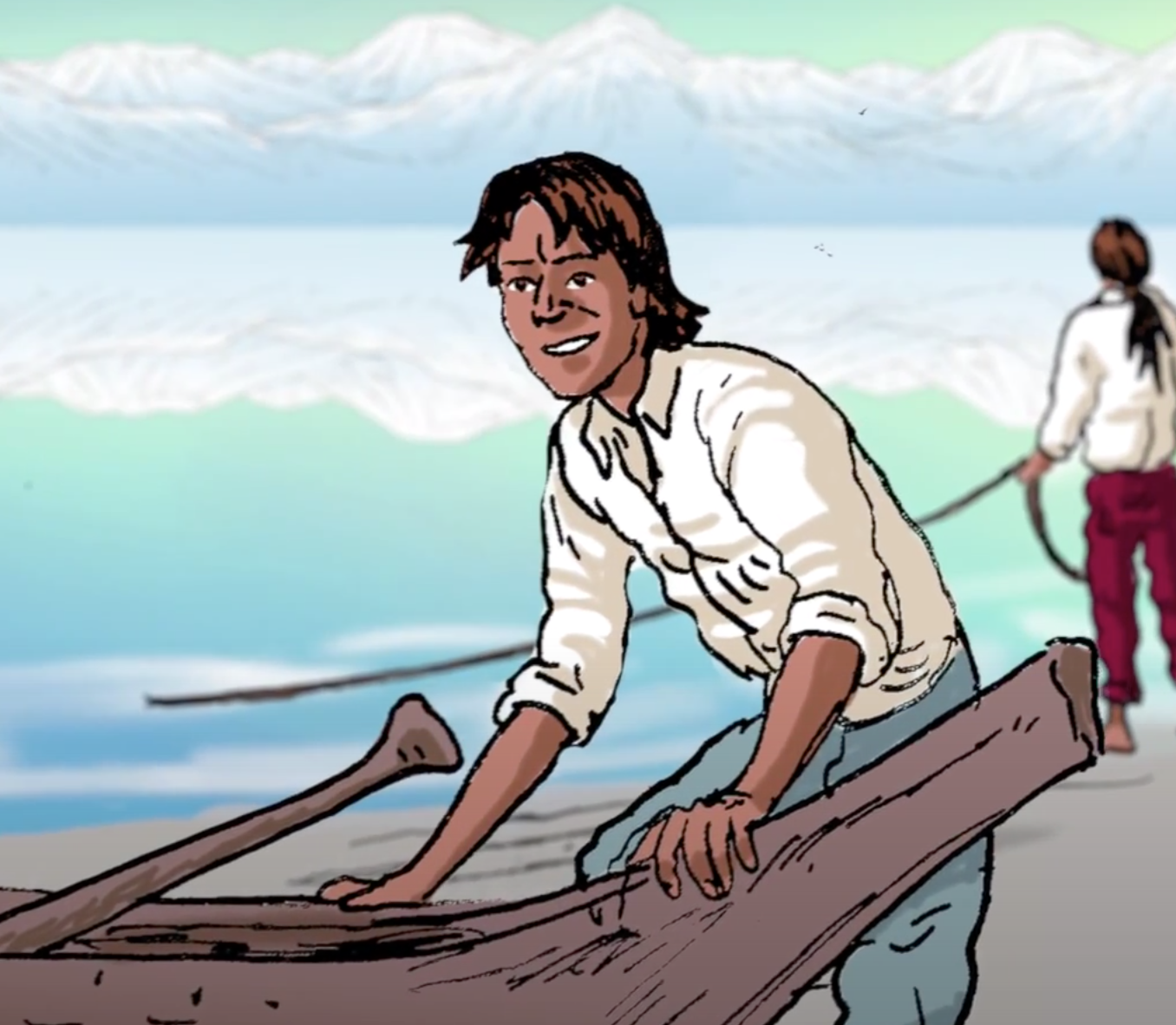
Čiiƛčiiyičiʔaƛ mityuuʔi. ʔanaḥʔis Huksyuu n̓ačuʔałʔaƛ miʕaat ʔani hiłʔaƛ hiłsn̓uł hitinqisʔi ḥaaƛ (= ʔaḥʔaaʔaƛ) mityuuʔi hiniip̓aƛʔał. ʔaḥʔaaʔaƛ waaʔaƛ ʔuukʷił neʔiiqsak: “ʔapstiiyaƛitin wahaak hił muułukʔitq ʔuyi. Wik̓aaḥaƛitin ʔayiip miʕaat ḥaay̓iyimtqun. ƛułukʷin qʷaaʔapqin!”
They start hauling in the net. Small Number sees that all fish within the area between the beach and the net are captured and says to his uncle, “Good that we came during the high tide. If the tide were low we wouldn’t catch this many fish. Our ways are good!”
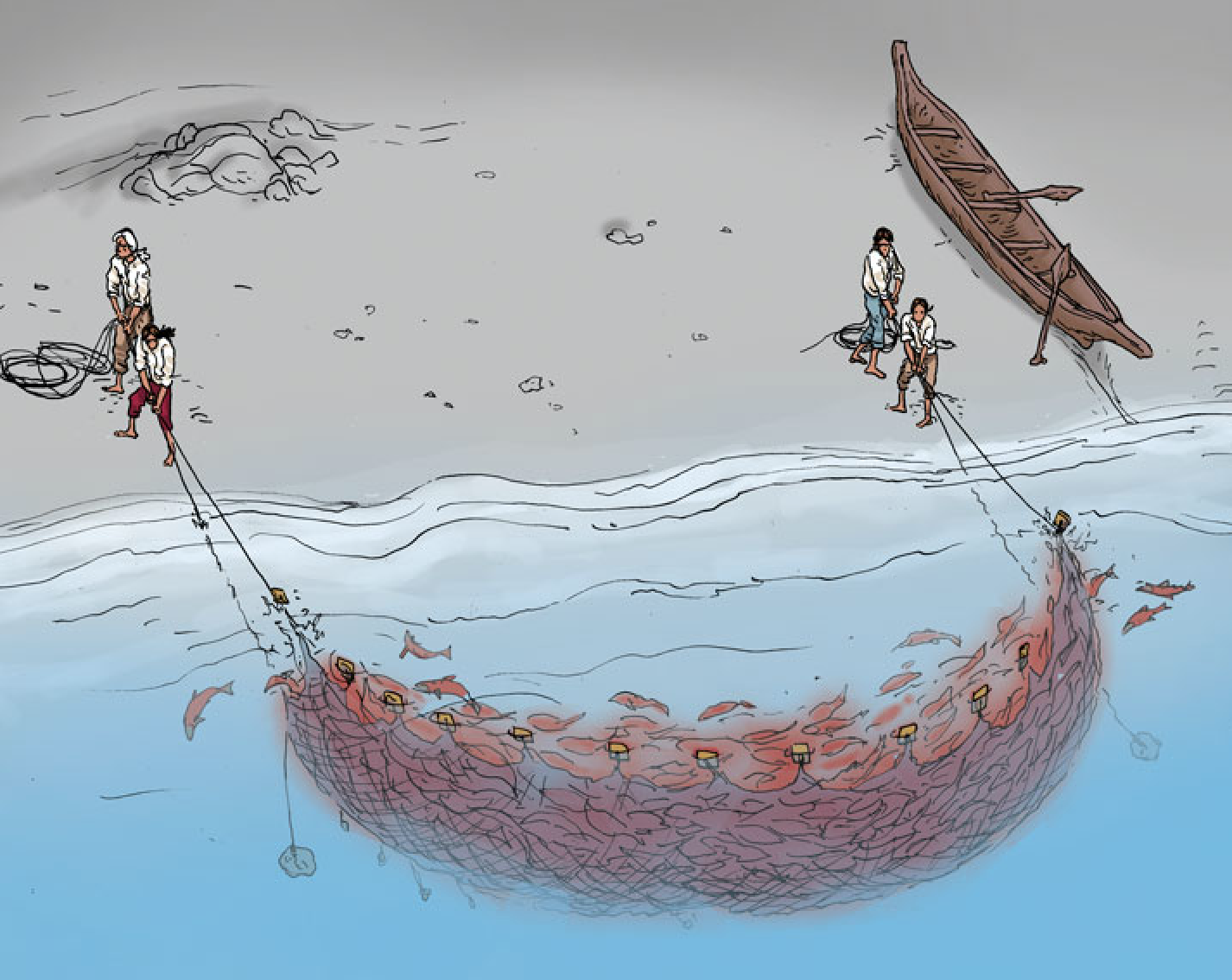
ʔaʔaatuʔaƛ ʔanaḥʔisʔi Huksyuu t̓apatšiʔaƛ: “ʔaaqḥinkmatakitḥin wik ʔayiip ʔuyimtqun ḥay̓iiya?”
Question: Why did Small Number think that during a low tide the catch would be much smaller?
